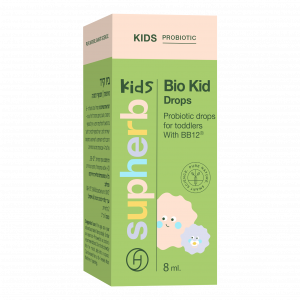- Home
- Infants and kids
- How to Treat Colic in Babies
How to Treat Colic in Babies
- A quarter of all babies suffer from colic, a phenomenon that comes with constant crying and discomfort, a ridged and swollen abdomen and a change in muscle tone. Gas is a main part of the issue, but not necessarily its cause.
- No one’s been able to isolate the single cause of colic, and it’s believed to have to do with several factors, among them bacterial structure changes in the baby’s intestine.
- Clinical trials show the effectiveness of probiotic bacteria named Lactis BB12, improving the symptoms of colic in babies, showing that 80% of babies who received those bacteria had a distinct decline in episodes duration and shorter crying outbursts.

Gas in babies is a common phenomenon and many parents find themselves helpless before a screaming baby, suffering from stomach pain and discomfort. In some cases, this is defined as colic. What causes it and is there a way to make it better?
What age does gas start?
Gas in babies can start as early as 3-4 months old and can similarly appear both in breastfeeding and formula-fed babies. Gas in breastfeeding babies often has to do with the mother’s diet, but not always. Eating foods such as onions, broccoli, turnip, cabbage, melon, peach, apricot or prunes can cause ‘temporary colic’ for 24 hours after consumption. If there’s a link, try and avoid these foods and see if there’s a change.
Is there a difference between gas and colic?
Many people regard gas and colic as the same phenomenon, but not every baby that suffers from gas might have colic. In colic the gases are indeed a main part of the issue, but not necessarily. It’s in fact a digestive system malfunction in babies that occurs in the first three months of their lives and only lasts longer in rare cases. The baby’s digestive system gets to know the outside world in its first few months, which can result in stomach aches, gas, diarrhea or constipation.
The baby won’t stop crying?
Colic can cause crying-outbursts and discomfort, change in baby muscle tone, redness in the face, rigid or swollen abdomen, leg raising and clutching of fists, with the baby being vital throughout all these. This phenomenon is common in the first three months of the baby’s life with its peak around 6 weeks old. It’s diagnosed by pediatricians after other medical reasons have been ruled out.
A quarter of all babies suffer from colic
We haven’t been able to isolate a single factor responsible for this situation, though there are a few possibilities to its source: lack of digestive system maturity, smoking around the baby, wrong feeding techniques encouraging excessive intake of air, exposure to proteins in mother’s milk or especially bovine milk in baby formula. It’s also believed that there is a link to the baby and mother’s temper. There are indications of a link between a change in the bacteria structure in the intestine and colic.
The rule of three
Colic is defined by the rule of three: the events last at least 3 hours a day, at least 3 days a week for at least 3 weeks in the first 3 months. This phenomenon is diagnosed by these criteria and once other medical reasons have been ruled out. Even though this goes by on its own, it causes suffering and discomfort both for babies and parents.
Gas and stomach aches and how they relate to bacteria
There’s a wide range of natural bacteria in the digestive system, with their ratios affecting the phenomenon. One of the speculations regarding colic has to do with their intestinal bacteria compound. The instability of the bacteria and over-thriving of harmful bacteria over ‘friendly’ ones might cause conditions such as gas, stomach aches, diarrhea or constipation.
New research checks the effects of a probiotic bacteria on colic in babies
New research published in a highly regarded magazine, presents interesting findings when it comes to the influence of the probiotic bacteria BB12. In fact, those same friendly bacteria are the first ones to populate the baby’s digestive system and are very important. They’re presence in the first year of life is linked to a healthy functioning of the digestive system in the research, and probably also later on in life.
The results were surprising!
80% of the babies that received the BB12 supplement showed a significant and distinct decline in episodes, compared to 32% of the babies who received placebos – the crying-outbursts shortened, and they felt better as early as the first week of trails. In addition, there was a positive effect on the frequency and texture of the discharge and sleep durations.
According to the new research, it seems that there’s a way to alleviate colic. Even though the factors are not conclusively clear, it seems that adding the probiotic Lactis BB12 bacteria might help in many cases. Due to the impressive results, it even received a trademark and is considered safe to use.








